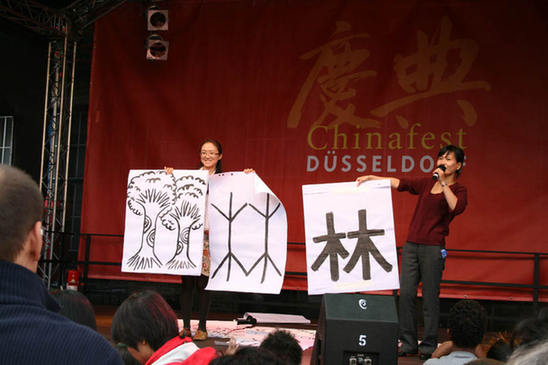Confucius: Education Should Be Accessible to Everyone – Confucius Institute Düsseldorf Builds a Bridge to Chinese Language and Culture
Teachers from the CI Düsseldorf observe the development process of pictographic Chinese characters on the main stage of the annual China festival.

Besides regular programs, CI Düsseldorf also offers extra courses tailored to individual needs. “In this way we try to cater to the relatively heterogeneous structure of our student body,” Eberspächer said.
A notable student in one such individual program is German table tennis player Timo Boll, who is something of a celebrity in the People’s Republic. “Boll knows that he is more famous in China than in Germany, and so wants to be able to speak at least a little Chinese,” the CI director said. “Big company executives also take part in our individual courses.”
Teachers provide students with modern language learning materials, mostly free of charge. They constitute the basis of the CI Düsseldorf learning process because, as Eberspächer told us, “Our Chinese tutors use interactive teaching methods based on real communication.”
“Instead of strictly following the textbook in class, they also introduce individual elements. Our strength lies in this emphasis on communication and interactive use of everyday language.”
In comparison with “German as a foreign language (DaF),” which has long been established as an independent scientific discipline in Germany and in many other countries around the globe, “Chinese as a foreign language” is still in its infancy in this respect.
Dr. Eberspächer said that the ongoing institutional development and rapid expansion of teaching practice has resulted in a closer association between professional education and research into Chinese as a foreign language.
As an associated institute, the CI is prominent in the field of China studies at Heinrich-Heine University Düsseldorf, which originally did not hold sinological seminars. Today, in cooperation with the university’s language center, the institute organizes language courses as well as single or serial lectures for local students on such topics as Chinese philosophy, history and literature.
“The courses are very well received by students and earn them credits for the university’s studium universale, which is now a required subject for all students. We and the university language center are also working on the establishment of a special China certificate, for which each student is eligible, in addition to that relating to their regular studies,” Eberspächer said.
Students gain the certificate through taking a certain number of required courses on Chinese language, culture, economy and politics. Upon finishing their studies it acts as verification of their China qualifications, for example when they apply for jobs. “It’s a kind of ‘mini-degree’ in sinology,” Eberspächer said.
- Dang Zhongxin: Breathing New Life into an Antique Opera
- Confucius: Education Should Be Accessible to Everyone – Confucius Institute Düsseldorf Builds a Bridge to Chinese Language and Culture
- Decipher the Overseas Success of “Decoded”
- If You Are the One: Love at First Sight
- Chinese Contemporary Artists (7) Wang Tiantian: A Different Story to Tell from Previous Generations
